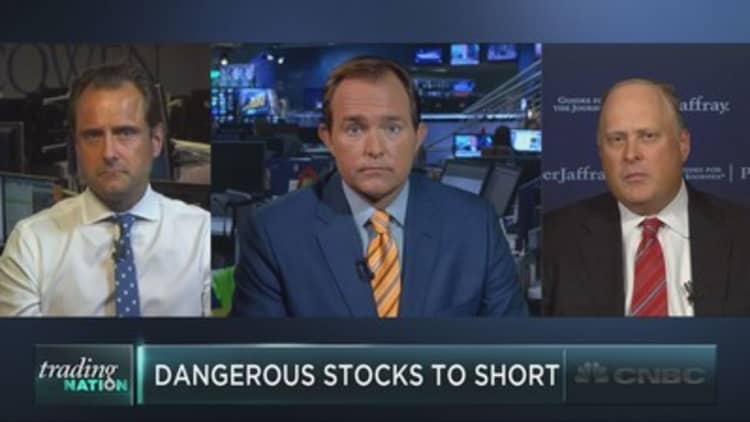
This cannot be what the bears were hoping for.
QVC parent Liberty Interactive announced their intention to acquire online retailer Zulily on Monday at a price of $18.75, which represented a 49 percent premium to the stock's Friday closing price. The shares of Zulily promptly rose to that exact level, closing Monday trading a penny below it.
The big losers here are the many traders short the stock. According to FactSet, some 27 percent of the Zulily shares available for trading are held short. That's substantially above the short interest for fellow online retailers like Overstock (8.5 percent short) or Amazon (1.3 percent).
Shorting a stock is the opposite of buying a stock; instead of buying now and planning to sell later at higher prices, a trader who shorts a stock sells now and hopes to buy it back later at lower prices. Needless to say, the mechanics are a bit more complicated, as a short seller must borrow those shares from an investor who holds them.
Shorting is often considered risky, due to the potential downside involved. After all, an individual who buys a stock knows precisely how much she could lose—the amount that she paid—because a stock's price can't fall any lower than zero. But a stock could theoretically rise to infinity, meaning that an individual who is short has no way of gauging how large here losses could be.
When it comes to those short Zulily, this sudden acquisition pretty much counts as a worst-case scenario.
The stock had seen a surge in short interest starting in the latter half of 2014. Chief among the concerns surrounding the company had been declining sales growth; the company logged revenue growth of 87 percent from Q1 2013 to Q1 2014, 29 percent from Q1 2014 to Q1 2015, and just 4 percent from Q2 2014 to Q2 2015.
Amid this "big declaration in growth," the concern was that Zulily was "beginning to tap out or saturate the market," according to an analyst who covers the stock but did not wish to be quoted by name because he thinks his fundamental take on the company is no longer relevant post offer.
After all, Zulily isn't for everyone. Its products take an average of two weeks to arrive, the analyst said, meaning that Zulily was "zagging while Amazon and everyone else is zigging."
Interestingly, despite the 49 percent one-day pop in the stock, those who got short at the beginning of the year have still done nicely. The stock is down 20 percent in 2015, and has lost 70 percent of its value in the past 17 months.






